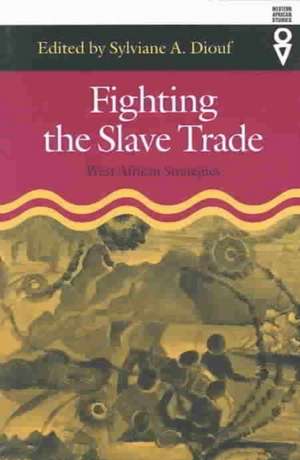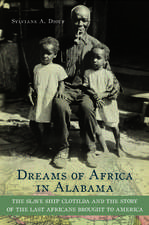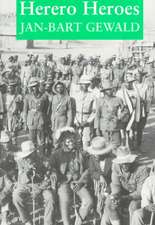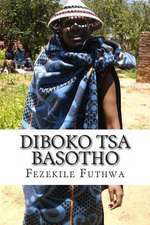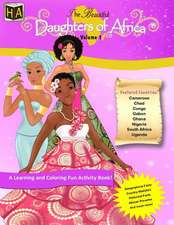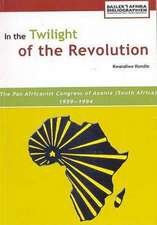Fighting the Slave Trade: West African Strategies: Western African Studies
Autor Sylviane A. Dioufen Limba Engleză Paperback – 23 oct 2003
While most studies of the slave trade focus on the volume of captives and on their ethnic origins, the question of how the Africans organized their familial and communal lives to resist and assail it has not received adequate attention. But our picture of the slave trade is incomplete without an examination of the ways in which men and women responded to the threat and reality of enslavement and deportation.
Fighting the Slave Trade is the first book to explore in a systematic manner the strategies Africans used to protect and defend themselves and their communities from the onslaught of the Atlantic slave trade and how they assaulted it.
It challenges widely held myths of African passivity and general complicity in the trade and shows that resistance to enslavement and to involvement in the slave trade was much more pervasive than has been acknowledged by the orthodox interpretation of historical literature.
Focused on West Africa, the essays collected here examine in detail the defensive, protective, and offensive strategies of individuals, families, communities, and states. In chapters discussing the manipulation of the environment, resettlement, the redemption of captives, the transformation of social relations, political centralization, marronage, violent assaults on ships and entrepôts, shipboard revolts, and controlled participation in the slave trade as a way to procure the means to attack it, Fighting the Slave Trade presents a much more complete picture of the West African slave trade than has previously been available.
Fighting the Slave Trade is the first book to explore in a systematic manner the strategies Africans used to protect and defend themselves and their communities from the onslaught of the Atlantic slave trade and how they assaulted it.
It challenges widely held myths of African passivity and general complicity in the trade and shows that resistance to enslavement and to involvement in the slave trade was much more pervasive than has been acknowledged by the orthodox interpretation of historical literature.
Focused on West Africa, the essays collected here examine in detail the defensive, protective, and offensive strategies of individuals, families, communities, and states. In chapters discussing the manipulation of the environment, resettlement, the redemption of captives, the transformation of social relations, political centralization, marronage, violent assaults on ships and entrepôts, shipboard revolts, and controlled participation in the slave trade as a way to procure the means to attack it, Fighting the Slave Trade presents a much more complete picture of the West African slave trade than has previously been available.
| Toate formatele și edițiile | Preț | Express |
|---|---|---|
| Paperback (1) | 259.31 lei 43-57 zile | |
| Ohio University Press – 23 oct 2003 | 259.31 lei 43-57 zile | |
| Hardback (1) | 476.05 lei 43-57 zile | |
| Ohio University Press – 23 oct 2003 | 476.05 lei 43-57 zile |
Preț: 259.31 lei
Nou
Puncte Express: 389
Preț estimativ în valută:
49.62€ • 51.94$ • 41.06£
49.62€ • 51.94$ • 41.06£
Carte tipărită la comandă
Livrare economică 07-21 aprilie
Preluare comenzi: 021 569.72.76
Specificații
ISBN-13: 9780821415177
ISBN-10: 0821415174
Pagini: 288
Dimensiuni: 156 x 235 x 23 mm
Greutate: 0.38 kg
Ediția:1
Editura: Ohio University Press
Colecția Ohio University Press
Seria Western African Studies
ISBN-10: 0821415174
Pagini: 288
Dimensiuni: 156 x 235 x 23 mm
Greutate: 0.38 kg
Ediția:1
Editura: Ohio University Press
Colecția Ohio University Press
Seria Western African Studies
Recenzii
“This book should be required reading for anyone interested in the West Africans’ fight against enslavement.”—Rachel Dowty, Journal of World History
“The scholars in this collection overwhelmingly argue that certain populations of West Africans were keenly aware of the devastating impact of the transatlantic slave trade on their societies, and these populations sought to mitigate the damages as best they could.... This collection is particularly useful in teaching undergraduate and graduate students about the transatlantic slave trade to counter and balance the pervasive belief that Africans were either passive victims or active participants in slavery.” —African Studies Quarterly
“Fighting the Slave Trade provides a comprehensive and compelling interpretation of the West African involvement in the Atlantic trade…Its clear language and engaging style make it relevant both to specialists and a broader readership.”—Benedetta Rossi, Progress in Development Studies
Notă biografică
The author of the award-winning Servants of Allah: African Muslims Enslaved in the Americas, Sylviane A. Diouf also initiated and co-organized the conference “Fighting Back: African Strategies against the Slave Trade” held at Rutgers University. She is a researcher at the Schomburg Center for Research in Black Culture at the New York Public Library.
Cuprins
- Preface
- Introduction
Sylviane A. Diouf - Part 1: Defensive Strategies
- 1. Lacustrine Villages in South Benin as Refuges from the Slave Trade
Elisée Soumonni - 2. Slave-Raiding and Defensive Systems South of Lake Chad from the Sixteenth to the Nineteenth Century
Thierno Mouctar Bah - 3. The Myth of Inevitability and Invincibility: Resistance to Slavers and the Slave Trade in Central Africa, 1850–1910
Dennis D. Cordell - 4. The Impact of the Slave Trade on Cayor and Baol: Mutations in Habitat and Land Occupancy
Adama Guèye - 5. Defensive Strategies: Wasulu, Masina, and the Slave Trade
Martin A. Klein - Part 2: Protective Strategies
- 6. The Last Resort: Redeeming Family and Friends
Sylviane A. Diouf - 7. Anglo-Efik Relations and Protection against Illegal Enslavement at Old Calabar, 1740–1807
Paul E. Lovejoy and David Richardson - Part 3: Offensive Strategies
- 8. Igboland, Slavery, and the Drums of War and Heroism
John N. Oriji - 9. “A Devotion to the Idea of Liberty at Any Price”: Rebellion and Antislavery in the Upper Guinea Coast in the Eighteenth and Nineteenth Centuries
Ismail Rashid - 10. Strategies of the Decentralized: Defending Communities from Slave Raiders in Coastal Guinea-Bissau, 1450–1815
Walter Hawthorne - 11. The Struggle against the Transatlantic Slave Trade: The Role of the State
Joseph E. Inikori - 12. Shipboard Revolts, African Authority, and the Transatlantic Slave Trade
David Richardson - Epilogue: Memory as Resistance: Identity and the Contested History of Slavery in Southeastern Nigeria, an Oral History Project
Carolyn A. Brown - Contributors
- Index
Descriere
While most studies of the slave trade focus on the volume of captives and on their ethnic origins, the question of how the Africans organized their familial and communal lives to resist and assail it has not received adequate attention.
